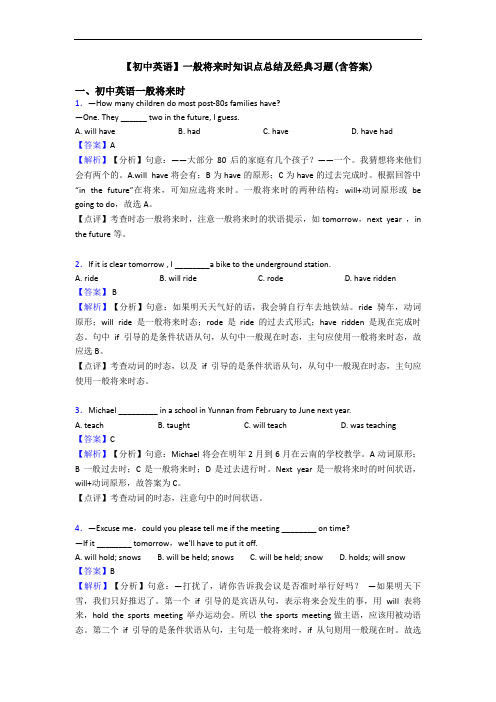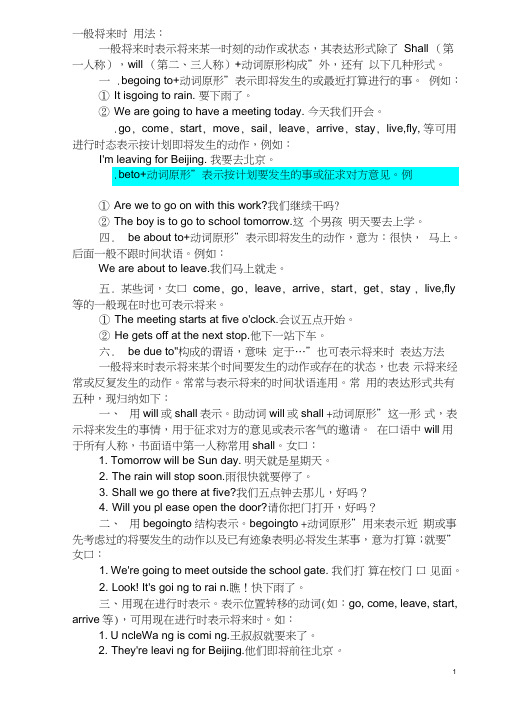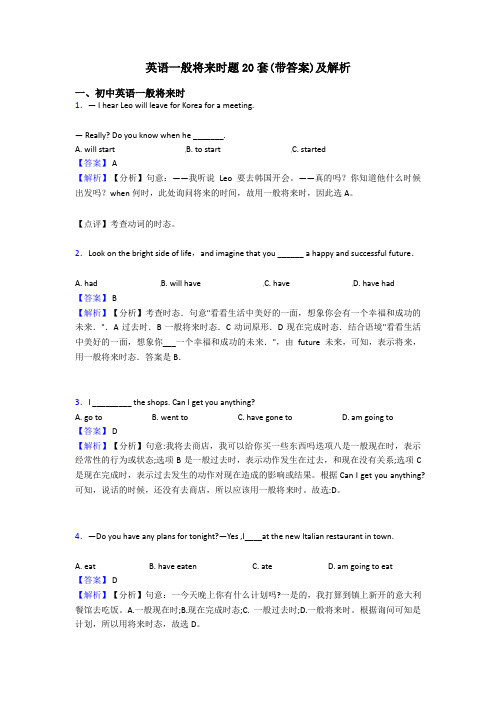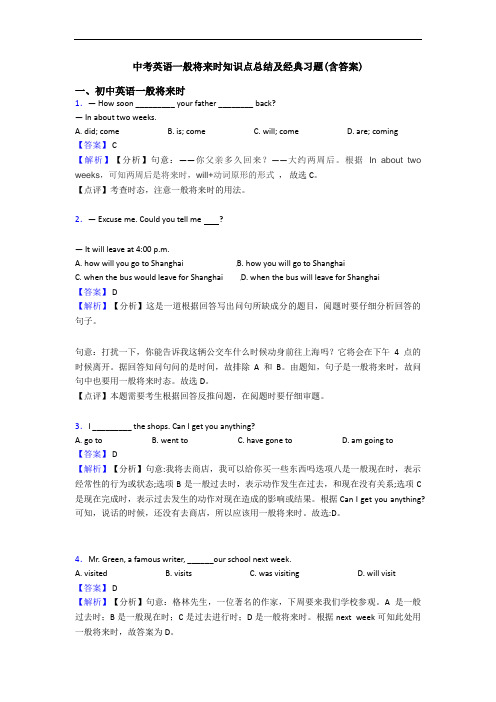【英语】一般将来时知识点总结及经典习题(含答案)(word)
【初中英语】一般将来时知识点总结及经典习题(含答案)

【初中英语】一般将来时知识点总结及经典习题(含答案)一、初中英语一般将来时1.—How many children do most post-80s families have?—One. They ______ two in the future, I guess.A. will haveB. hadC. haveD. have had【答案】A【解析】【分析】句意:——大部分80后的家庭有几个孩子?——一个。
我猜想将来他们会有两个的。
A.will have将会有;B为have的原形;C为have的过去完成时。
根据回答中“in the future”在将来,可知应选将来时。
一般将来时的两种结构:will+动词原形或be going to do,故选A。
【点评】考查时态一般将来时,注意一般将来时的状语提示,如tomorrow,next year ,in the future等。
2.If it is clear tomorrow , I ________a bike to the underground station.A. rideB. will rideC. rodeD. have ridden【答案】 B【解析】【分析】句意:如果明天天气好的话,我会骑自行车去地铁站。
ride骑车,动词原形;will ride是一般将来时态;rode是ride的过去式形式;have ridden是现在完成时态。
句中if引导的是条件状语从句,从句中一般现在时态,主句应使用一般将来时态,故应选B。
【点评】考查动词的时态,以及if引导的是条件状语从句,从句中一般现在时态,主句应使用一般将来时态。
3.Michael _________ in a school in Yunnan from February to June next year.A. teachB. taughtC. will teachD. was teaching【答案】C【解析】【分析】句意:Michael将会在明年2月到6月在云南的学校教学。
一般将来时练习题含答案精选全文

精选全文完整版(可编辑修改)一般将来时练习一、用所给动词的一般将来时填空1. I ______(leave)in a minute. I ______(finish)all my work before I ______ (leave).2. —How long _____ you _____(study)in our country?—I _____(plan)to be here for about one more year.—I _____(hope)to visit the other parts of your country.—What ______ you ______(do)after you ______(leave)here?—I ______(return)home and ______(get)a job.3. I ______(be)tired. I ______(go)to bed early tonight.4. Mary’s birthday is next Monday, her mother _____(give)her a present.5. It is very cold these days. It ______(snow)soon.6. —_____ you _____(be)here this Saturday?—No. I ______(visit)my teacher.7. —______ I ______(get)you a copy of today’s newspaper?—Thank you.8. I am afraid there ______(be)a meeting this afternoon. I can’t join you.9. Mike ______(believe, not)this until he ______(see)it with his own eyes.10. Most of us don’t think their team ______(win).二、单项选择1. There __________ a meeting tomorrow afternoon.A. will be going toB. will going to beC. is going to beD. will go to be2. Charlie ________ here next month.A. isn’t workingB. doesn’t workingC. isn’t going to workingD. won’t work3. He ________ very busy this week, he ________ free next week.A. will be; isB. is; isC. will be; will beD. is; will be4. There ________ a dolphin show in the zoo tomorrow evening.A. wasB. is going to haveC. will haveD. is going to be5. –________ you ________ free tomorrow?– No. I ________ free the day after tomorrow.A. Are; going to; willB. Are; going to be; willC. Are; going to; will beD. Are; going to be; will be6. Mother ________ me a nice present on my next birthday.A. will givesB. will giveC. givesD. give7. – Shall I buy a cup of tea for you?–________. (不,不要。
(完整word版)一般将来时练习题及答案学习

一般将来时用法:一般将来时表示将来某一时刻的动作或状态,其表达形式除了Shall (第一人称),will (第二、三人称)+动词原形构成”外,还有以下几种形式。
一 .begoing to+动词原形”表示即将发生的或最近打算进行的事。
例如:①It isgoing to rain. 要下雨了。
②We are going to have a meeting today. 今天我们开会。
.go, come, start, move, sail, leave, arrive, stay, live,fly, 等可用进行时态表示按计划即将发生的动作,例如:①Are we to go on with this work?我们继续干吗?②The boy is to go to school tomorrow.这个男孩明天要去上学。
四.be about to+动词原形”表示即将发生的动作,意为:很快,马上。
后面一般不跟时间状语。
例如:We are about to leave.我们马上就走。
五.某些词,女口come, go, leave, arrive, start, get, stay , live,fly 等的一般现在时也可表示将来。
①The meeting starts at five o'clock.会议五点开始。
②He gets off at the next stop.他下一站下车。
六.be due to"构成的谓语,意味定于…”也可表示将来时表达方法一般将来时表示将来某个时间要发生的动作或存在的状态,也表示将来经常或反复发生的动作。
常常与表示将来的时间状语连用。
常用的表达形式共有五种,现归纳如下:一、用will或shall表示。
助动词will或shall +动词原形”这一形式,表示将来发生的事情,用于征求对方的意见或表示客气的邀请。
在口语中will用于所有人称,书面语中第一人称常用shall。
英语一般将来时题20套(带答案)及解析

英语一般将来时题20套(带答案)及解析一、初中英语一般将来时1.— I hear Leo will leave for Korea for a meeting.— Really? Do you know when he _______.A. will startB. to startC. started【答案】 A【解析】【分析】句意:——我听说Leo要去韩国开会。
——真的吗?你知道他什么时候出发吗?when何时,此处询问将来的时间,故用一般将来时,因此选A。
【点评】考查动词的时态。
2.Look on the bright side of life,and imagine that you ______ a happy and successful future.A. hadB. will haveC. haveD. have had【答案】 B【解析】【分析】考查时态.句意"看看生活中美好的一面,想象你会有一个幸福和成功的未来.".A过去时.B一般将来时态.C动词原形.D现在完成时态.结合语境"看看生活中美好的一面,想象你___一个幸福和成功的未来.",由future未来,可知,表示将来,用一般将来时态.答案是B.3.I _________ the shops. Can I get you anything?A. go toB. went toC. have gone toD. am going to【答案】 D【解析】【分析】句意:我将去商店,我可以给你买一些东西吗迭项八是一般现在时,表示经常性的行为或状态;选项B是一般过去时,表示动作发生在过去,和现在没有关系;选项C 是现在完成时,表示过去发生的动作对现在造成的影响或结果。
根据Can I get you anything?可知,说话的时候,还没有去商店,所以应该用一般将来时。
故选:D。
4.—Do you have any plans for tonight?—Yes ,I____at the new Italian restaurant in town.A. eatB. have eatenC. ateD. am going to eat【答案】 D【解析】【分析】句意:一今天晚上你有什么计划吗?一是的,我打算到镇上新开的意大利餐馆去吃饭。
英语一般将来时课堂语法笔记+习题(含答案)

一般将来时(The Simple Future tense)课堂语法笔记及习题一、概念及用法。
1. 表示将要发生的动作或存在的状态(will do)。
e.g. He will visit our school in half an hour.He will be very happy if he receives many gifts.2. 表示计划或打算做某事(be going to do)。
e.g. He is going to do his homework this afternoon.二、基本结构。
1. will do结构肯定句:主语+ will + 动词原形+ 其他. I will go and buy some beef.否定句:主语+ will + not(won't) + 动词原形+ 其他. I won't go and buy some beef.一般疑问句:Will +主语+动词原形+ 其他? Will you go and buy some beef?2. be going to do结构肯定句:主语+ be going to + 动词原形+ 其他. He is going to see a film tomorrow.否定句:主语+ be + not + going to + 动词原形+ 其他. He isn't going to see a film tomorrow. 一般疑问句:Be + 主语+ going to + 动词原形+ 其他. Is he going to see a film tomorrow? 三、标志词(时间状语)(一秒识别时态)tomorrow 明天, tonight今晚, the day after tomorrow后,next week (month, year …)下一周(月、年), this afternoon, evening …这个下午、晚上, soon不久、很快, in 2050 在2050年, in + 时间段(例如:in 5 years )5年后等。
【英语】一般将来时知识点题型(word)

【英语】一般将来时知识点题型(word)一、一般将来时1.There ___________ a meeting tomorrow afternoon.A. will be going toB. will going to beC. is going to beD. will go to be【答案】 C【解析】【分析】句意:明天下午将有一次会议。
根据时间状语tomorrow afternoon 可知这里应该是there be结构的将来时:there will be或there is going to be,根据句意,故答案为C。
【点评】考查be going to表示按计划,安排将要发生的事。
注意掌握一般将来时的构成,意义和用法。
2.If it is clear tomorrow , I ________a bike to the underground station.A. rideB. will rideC. rodeD. have ridden【答案】 B【解析】【分析】句意:如果明天天气好的话,我会骑自行车去地铁站。
ride骑车,动词原形;will ride是一般将来时态;rode是ride的过去式形式;have ridden是现在完成时态。
句中if引导的是条件状语从句,从句中一般现在时态,主句应使用一般将来时态,故应选B。
【点评】考查动词的时态,以及if引导的是条件状语从句,从句中一般现在时态,主句应使用一般将来时态。
3.— Excuse me. Could you tell me ?— It will leave at 4:00 p.m.A. how will you go to ShanghaiB. how you will go to ShanghaiC. when the bus would leave for ShanghaiD. when the bus will leave for Shanghai【答案】 D【解析】【分析】这是一道根据回答写出问句所缺成分的题目,阅题时要仔细分析回答的句子。
【英语】 一般将来时练习题基础、提高、难题_汇总(含答案)(word)

【英语】一般将来时练习题基础、提高、难题_汇总(含答案)(word)一、一般将来时1.—Have you finished the poster for the party?—Not yet. I it in two days.A. finishB. finishedC. will finishD. have finished【答案】 C【解析】【分析】此题的关键点在“in two days”和一般将来时连用,故选C。
句意是:—你已经完成聚会的海报了吗?—还没有,我会在两个以后完成的。
【点评】本题考查介词短语“ in +时间段”用于一般将来时。
2.I don't know whether mom _________ me to Beijing next week.A. takeB. takesC. will takeD. would take【答案】 C【解析】【分析】句意:我不知道妈妈下周是否会带我去北京。
分析句子结构可知,此处是宾语从句,主句时态为一般现在时,从句时态根据主现从任原则,再根据从句中的next week可知,从句应该是表示将来的动作,所以用一般将来时,用will do形式,故选C。
【点评】考查宾语从句时态。
注意宾语从句时态的主现从任原则。
3.Michael _________ in a school in Yunnan from February to June next year.A. teachB. taughtC. will teachD. was teaching【答案】C【解析】【分析】句意:Michael将会在明年2月到6月在云南的学校教学。
A动词原形;B一般过去时;C是一般将来时;D是过去进行时。
Next year是一般将来时的时间状语,will+动词原形,故答案为C。
【点评】考查动词的时态,注意句中的时间状语。
4.— There ________a football match on TV tonight. I can't wait to watch it.— Me, too. It's ________ Guangzhou Evergrande and the Australian team Melbourne Victory.A. will be; betweenB. will be; bothC. will have; betweenD. will have; both【答案】A【解析】【分析】句意为:---今晚将有一场电视直播足球比赛,我非常想看。
(完整word)一般将来时练习题100道(附答案)

一般将来时练习题100道一、选择题1. “The meeting is scheduled to begin at 7 o’clock。
" “But _______ a delay。
”A. It will be B。
there’d beC. there will beD. there is2. He’ll leave for Paris before you ______ next week。
A。
will come back B。
will be backC. come back D。
came back3. Our next meeting _______ on 1st December.A。
has been held B。
will holdC. is to be held D。
is holding4. Where ________ is a will, there is a way。
A. there will haveB. has been thereC. there is D。
there has been5. It ________ be Wednesday tomorrow。
A. is going to B。
willC. is about toD. is to6. There __________ a meeting tomorrow afternoon。
A。
will be going to B. will going to beC. is going to beD. will go to be7。
Charlie ________ here next month。
A。
isn’t working B. doesn't workingC. isn’t going to working D。
won’t work8。
He ________ very busy this week, he ________ free next week.A。
一般将来时讲解(附习题+答案)

一般将来时讲解(附习题+答案)一、一般将来时的含义:表示动作发生在将来二、一般将来时的句型:(1) will/shall+动词原形(2) be going to+动词原形三、一般将来时的时间状语:tomorrow(明天)、the day after tomorrow(后天)、next...(下一...): next week(下一周)、next year(明年)、next month(下个月)in+一段时间(...之后): in three days(三天之后)、in the future在未来this evening(今天晚上)四、一般将来时的句型结构:(1) will/shall+动词原形(will not =won’t)(will 各种人称均可用,shall 只能用于第一人称)1)肯定句:主语+will/shall+动词原型...如:I will go to school tomorrow.我明天将会去学校He will go to school tomorrow.他明天将会去学校。
2)否定句:主语+will/shall+not+动词原型...如:I won’t go to school tomorrow.我明天将不会去学校。
He won’t go to school tomorrow.他明天将不会去学校。
3)一般疑问句:Will/Shall +主语+动词原型...如:Will you go to school tomorrow?你明天要去学校吗?Will he go to school tomorrow?他明天要去学校吗?肯定回答:Yes, 主语+will.如:Yes, I will.Yes, he will.否定回答:No,主语+will+not.如:No, I won’t.No, he won’t.4) 特殊疑问句:特殊疑问词+will/shall+主语+动词原型...如:What will you do tomorrow?你明天将会做什么?What will he do tomorrow?他明天将会做什么?(2) be going to+动词原形1)肯定句:主语+be going to +动词原型...如:I am going to buy some books tomorrow.我明天打算去买一些书。
一般将来时详解及练习

it'll,we'll,you'll,they'll。
'll,并与主语连写在一起,如:I'll,he'll,注:will 常简略为一、定义:表示将要发生的动作或存在的状态及打算、计划或准备做某事。
二、基本构成:①be going to +do.打算做某事一般将来时态:eg:I’m going to be a singer.我打算成为一名歌手。
She is going to learnEnglish.她打算去学习英语。
②will /shall +动词原形这种方法一般单纯地表示将来某个时间将要发生的动作或存在的状态。
will 用于各种人称;shall 只用于第一人称。
eg:I will /shall go to visit him next week.下周我将去拜访他。
What time shall we go there tomorrow?明天我们几点去那儿?③否定句:在be动词(am,is,are)后加not或情态动词will后加not构成won’t。
例如:I’m going to have a picnic this afternoon.→I’m not going to have a picnic this afternoon.④一般疑问句:be或will提到句首,some改为any,and改为or,第一二人称互换。
例如:We are going to go shopping this weekend.→Are you going to go shopping this weekend?⑤对划线部分提问:一般情况,一般将来时的对划线部分有三种情况。
1、问人。
Who例如:I’m going to New York soon.→Who’s going to New York soon?2、问干什么。
What…do例如:My father is going to watch football games with methis afternoon.→What is your father going to do with you this afternoon?3、问什么时候。
(文末有答案)通用版高中英语一般将来时时态基础知识点详解

(文末有答案)通用版高中英语一般将来时时态基础知识点详解单选题1、If you don’t go to that school, _________.A.neither shall IB.nor do IC.so do ID.neither do I2、---Would you like to climb the hill with us tomorrow?---If it ___________, I ___________.A.doesn't rain; will goB.won't rain; will goC.don't rain; goD.doesn't rain; go3、There________ a party this weekend.A.is going to haveB.are going to haveC.is going to beD.are going to be4、Flight BA 2793 _____ at 8:20. Hurry up!A.leavesB.leftC.has leftD.leaving5、—Ann is in hospital.— Oh, really? I ______ know. I _______ go and visit her.A.didn’t, am going toB.don’t, am going toC.don’t, willD.didn’t, will6、He says that if it tomorrow, he fishing.A.will rain; won’t goB.rained; will goC.rains; won’t goD.rain; will go7、(2013·东北三校一模)I am certain by no means ________ his word since he has promised an amount of money to the poor.A.he will breakB.will he breakC.brokeD.did he break8、—Alas! I have left my key to the office in my car.—Don't worry. I it for you. Wait a minute.A.getB.am going to getC.will getD.am getting9、—I'm sure I will get good grades in the graduation exam.—If so, I believe your parents________happy.A.would beB.areC.wereD.will be10、Follow these tips, and your time doing research on the Internet much more worthwhile. A.being spent; will beB.spent; will beC.spent; isD.having spent; has been11、—I have not heard from Mark for a long time. I'm quite worried about him.—OK. I ___________ you know the minute I hear anything.A.have letB.letC.would letD.will let12、-You haven’t switched off the light.-Oh, don’t worry. I ________ and turn it off.A.will goB.goC.have goneD.went13、I don't know when he back. Please tell me when he back. A.comes, comesB.comes, will comeC.will come, comesD.will come, come14、Follow these tips, and your time spent doing research on the Internet ______ much more worthwhile. A.wasB.has beenC.will beD.will have been15、The song writer and music composer _______ to show up at the press conference next week.A.are goingB.is goingC.will beD.are16、If you want to visit the Palace Museum,I ________ tickets for you tomorrow.A.will bookB.bookedC.have bookedD.was booking17、-Do you have any plans for tonight?-Yes ,I _____ at the new Italian restaurant in town.A.eatB.have eatenC.ateD.am going to eat18、—Tom, the light is still on.—Sorry, I forgot! I_______ to turn it off now.A.am going to goB.would goC.was goingD.will go19、Please wear your best clothes on Monday, as your class photos ______ then.A.will takeB.will be takenC.have takenD.have been taken20、Plato believed that talent and intelligence _________genetically and thus _________in children born to all classes, although his proposed system of selective public education for an educated minority of the population does not really follow a democratic model.A.is not distributed, is to be foundB.are not distributed, are to be foundC.is not distributed, has been foundD.are not distributed, have been found21、—Did you tell Julia about the result?—Oh, no, I forgot. I _____________ her now.A.will be callingB.will callC.callD.am to call22、—When will the next meeting begin?— I have no idea. But just a minute, I ______ it for you.A.will checkB.checkedC.checkD.would check23、—Where is Alice? The film will begin soon.—Don’t worry. I ________ her right away.A.callB.will callC.have calledD.was calling24、—What are you doing on Saturday morning?—Well,it's going to be sunny,so I ____________ a picnic with my friend.A.haveB.hadC.have hadD.·am having25、I ________ for Beijing next Saturday. Do you know when the earliest plane ________ on Saturday?A.am leaving; takes offB.leave; takes offC.leave; is taking offD.am leaving; is taking off26、Although it hasn’t been published, I think this book _____ by tho se who have learned only a little English and are ready to improve it.A.likedB.has been likedC.would likeD.will be liked27、A kind of newly-made shoes, if put into the market, _________ large orders because the heels can switch from 4 to 9 centimeters.A.meetsB.will meetC.has metD.met28、—Hi, Mr. Smith. Which department do you work in?—I am in the Marketing Department now, but I_________ in the Sales Department before long. A.workedB.will workC.have workedD.will have worked29、—Good news! The Underground Line 1 in Nantong________to come into service soon. —That’s great! Transport will become much easier for us.A.will be expectedB.is expectedC.expectsD.is expecting30、He, as well as his two classmates, ________ going to take part in a piano competition. A.isB.areC.wasD.were31、--It’s said that your company _____ in the project in the years ahead, right?--Well, we are conducting a comprehensive evaluation of it. A.investsB.investedC.will investD.would invest32、—What’s the weather like tomorrow?—I have no idea. Just a minute, I ________ it for you.A.will checkB.have checkedC.checkedD.had checked33、—Have you told Mr. Reeve about the meeting?—Not yet. I ________ him in a minute.A.calledB.callC.will callD.have called34、John isn’t here right now. He ______ Mr. Black’s office. Perhaps he______ in several minutes.A.is going to; has comeB.has been to; has comeC.has gone to; will comeD.went to; would come35、 --What are you going to do this afternoon?-- I am going to the cinema with some friends. The film _______ quite early, so we __________ to the bookstore after that.A.finished; are goingB.finished; goC.finishes; are goingD.finishes; go36、Stick to your plan and you ________ the task on time.A.finishedB.finishingC.has finishedD.will finish37、—I wonder if Doctor Watt ________ the party tonight.—I don’t know,but I’ll let you know if he ________.A.will attend;will comeB.will attend;comesC.attends;will comeD.attends;comes38、Face the problem bravely and you ______ a new way to success.A.findB.foundC.will findD.have found39、He as well as his parents ________for Shanghai soon.A.are leavingB.is leavingC.leaveD.leaves40、Only in that way _______ ready for the challenges and opportunities in life.A.will we beB.we will beC.will be weD.we shall be41、You rather than I ________ going to go camping.A.will beB.amC.isD.are42、— I want to know when Lucy ______ to my birthday party this Sunday.—I don’t know. But I think she will tell me when she ______.A.comes; comesB.comes; will comeC.will come; comesD.will come; will come43、What do you think ______ to John if he finds his bike has been stolen?A.will happenB.happenedC.to have happenedD.to happen44、It’s you, rather than he, that____ for the accident.A.are to blameB.are to be blamedC.is to blameD.is to be blamed45、47.5% of the rice produced on this farm ______ to other countries at the end of next month. A.will exportB.is going to be exportedC.are to be exportedD.will have exported(文末有答案)通用版高中英语一般将来时时态_00B参考答案1、答案:A解析:考查部分倒装和一般将来时。
(完整word版)一般将来时态讲解及练习和答案

1、概述一般将来时表示将来某个时间要发生的动作或存在的状态,常与表示将来的时间状语连用,如tomorrow,next week,next year等。
Why don’t you put the meat in the fridge? It will stay fresh for several days.为什么不把肉放在冰箱里?它可以保鲜好几天。
—You’ve left the light on。
你忘了关灯了。
- Oh , so I have。
I'll go and turn it off。
噢,那我马上去关.2、构成一般将来时由“助动词will/shall+动词原形”构成。
will用于第二、三人称,shall第一人称。
在口语中,will在名词或代词后常缩写为’ll,will not简缩为won’t[wount]。
但在美国英语中,各种人称皆可用will。
He will help his sister with her lessons。
他将帮助他妹妹做功课.We won’t be free this afternoon.今天下午我们没空。
3、一般将来时的用法(1)表示未来的动作或存在状态,常与表示将来的时间状语连用,如tomorrow, next Sunday, soon,in a month, in the future等。
We shall leave for London next Monday.我们将在下周一去伦敦。
He will come to see you the day after tomorrow.后天他要来看你。
You will be 20 next year。
明年你就二十了。
(2)表示将来反复发生的动作或习惯性动作We shall come and work in this factory every year.我们将每年来这工厂参加劳动。
The students will have five English classes per week this term.本学期学生每周将要上五节英语课。
英语中一般将来时的总结与练习题

英语中一般将来时的总结与练习题一、一般将来时的总结1. 一般将来时的定义一般将来时表示将来某个时间要发生的动作或存在的状态,也常用于表示将来一段时间内的经常性动作或状态。
在英语中,一般将来时主要由助动词“will”或“shall”(第一人称)加动词原形构成。
此外,“be going to + 动词原形”也可表示将来时,常用于根据目前已知的情况预测未来即将发生的动作或状态。
2. 一般将来时的常见形式•“will + 动词原形”•“shall + 动词原形”(第一人称)•“be going to + 动词原形”•“be to do”结构(表示按计划或安排即将发生的动作)•“be about to + 动词原形”(表示即将发生的动作,不能与表示将来的时间状语连用)3. 一般将来时的用法•表示将来的动作或状态,通常与表示将来的时间状语连用,如“tomorrow”, “next year”, “in the future”等。
•表示根据现有情况推测未来可能发生的动作或状态,常用于“be going to”结构中。
•表示计划、安排或打算做的事情,常与“be to do”结构连用。
4. 与其他时态的区别•与现在进行时区别:现在进行时表示正在进行的动作,而一般将来时表示将来某个时间要发生的动作。
•与现在完成时区别:现在完成时表示过去发生的动作对现在造成的影响或结果,而一般将来时则表示未来即将发生的动作。
二、一般将来时的练习题1. 选择题(1) —_____ you _____ a party next weekend?—Yes, we will.A. Will; haveB. Are; havingC. Do; haveD. Are; go to have(2) They _____ a meeting this afternoon.A. are havingB. are going to haveC. will havingD. will have(3) —_____ you _____ your homework before you watch TV?—Yes, I _____.A. Will; do; willB. Are; doing; amC. Are; going to do; amD. Will; do; am2. 填空题(1) I _____ (meet) my friend at the airport tomorrow.(2) They _____ (not go) to the zoo if it rains.(3) We _____ (have) a picnic next Sunday. Will you join us?3. 翻译题(1) 明天我要去看望我的祖父母。
中考英语一般将来时知识点总结及经典习题(含答案)

中考英语一般将来时知识点总结及经典习题(含答案)一、初中英语一般将来时1.— How soon _________ your father ________ back?— In about two weeks.A. did; comeB. is; comeC. will; comeD. are; coming【答案】 C【解析】【分析】句意:——你父亲多久回来?——大约两周后。
根据In about two weeks,可知两周后是将来时,will+动词原形的形式,故选C。
【点评】考查时态,注意一般将来时的用法。
2.— Excuse me. Could you tell me ?— It will leave at 4:00 p.m.A. how will you go to ShanghaiB. how you will go to ShanghaiC. when the bus would leave for ShanghaiD. when the bus will leave for Shanghai【答案】 D【解析】【分析】这是一道根据回答写出问句所缺成分的题目,阅题时要仔细分析回答的句子。
句意:打扰一下,你能告诉我这辆公交车什么时候动身前往上海吗?它将会在下午4点的时候离开。
据回答知问句问的是时间,故排除A和B。
由题知,句子是一般将来时,故问句中也要用一般将来时态。
故选D。
【点评】本题需要考生根据回答反推问题,在阅题时要仔细审题。
3.I _________ the shops. Can I get you anything?A. go toB. went toC. have gone toD. am going to【答案】 D【解析】【分析】句意:我将去商店,我可以给你买一些东西吗迭项八是一般现在时,表示经常性的行为或状态;选项B是一般过去时,表示动作发生在过去,和现在没有关系;选项C 是现在完成时,表示过去发生的动作对现在造成的影响或结果。
一般将来时知识点总结及经典习题(含答案)

14.-- Tommy, do you know if they _____ to the zoo this Sunday if it _____?
-- Sorry, I have no idea.
【点评】考查动词的时态。
15.—Have you finished the poster for the party?
—Not yet. Iit in two days.
A. finish B. finished C. will finish D. have finished
【答案】C
【解析】【分析】此题的关键点在“in two days”和一般将来时连用,故选C。句意是:—你已经完成聚会的海报了吗?—还没有,我会在两个以后完成的。
A. will come; will come B. will come; comes C. comes; will come
【答案】A
【解析】【分析】句意:——你知道怀特太太今晚是否来吃晚饭吗?——不知道。但我认为如果她有空,她会来。空一,句子为含有宾语从句的主从复合句,主句是一般现在时,从句用它所需要的任何时态,根据this evening今晚,可知句子为一般将来时,will come;空二,回答是when引导的时间状语从句,从句是一般现在时,主句应用将来时,will come,故选A。
12.Many scientists believe that robotsable to talk like humans in 50 years.
A. were B. are C. will be D. have been
- 1、下载文档前请自行甄别文档内容的完整性,平台不提供额外的编辑、内容补充、找答案等附加服务。
- 2、"仅部分预览"的文档,不可在线预览部分如存在完整性等问题,可反馈申请退款(可完整预览的文档不适用该条件!)。
- 3、如文档侵犯您的权益,请联系客服反馈,我们会尽快为您处理(人工客服工作时间:9:00-18:30)。
【英语】一般将来时知识点总结及经典习题(含答案)(word)一、一般将来时1.—I wonder if you for a picnic tomorrow.—If it ,I will go.A. go, not rainB. go, doesn't rainC. will go, isn't rain.D. will go, doesn't rain.【答案】 D【解析】【分析】句意:--我想知道明天你是否去野餐。
--如果天不下雨,我就去。
分析:第一个句子为宾语从句,主句为一般现在时,从句用原来的时态;第二个句子为条件状语从句,体现主将从现的原则,主语是第三人称单数,因此助动词用does.故选D【点评】考查动词的用法。
2.I’m so lucky because I see more cartoon characters next month.A. is able toB. will be able toC. be able toD. was able to【答案】B【解析】【分析】句意:我真幸运因为我下个月能看到更多的卡通人物。
next month表将来,因此用will be able to。
故选B。
【点评】考查一般将来时。
3.Michael _________ in a school in Yunnan from February to June next year.A. teachB. taughtC. will teachD. was teaching【答案】C【解析】【分析】句意:Michael将会在明年2月到6月在云南的学校教学。
A动词原形;B一般过去时;C是一般将来时;D是过去进行时。
Next year是一般将来时的时间状语,will+动词原形,故答案为C。
【点评】考查动词的时态,注意句中的时间状语。
4.— There ________a football match on TV tonight. I can't wait to watch it.— Me, too. It's ________ Guangzhou Evergrande and the Australian team Melbourne Victory.A. will be; betweenB. will be; bothC. will have; betweenD. will have; both【答案】A【解析】【分析】句意为:---今晚将有一场电视直播足球比赛,我非常想看。
---我也是。
这是广州恒达足球俱乐部与澳大利亚墨尔本足球俱乐部之间的比赛。
根据语境,这是there be结构的一般将来时,应用there will be;both指两者,between指两者之间。
故选A。
【点评】考查there be结构以及词语辨析。
5.Susan and her sister ________ some photos in the park the day after tomorrow.A. takeB. tookC. will take【答案】 C【解析】【分析】句意:Susan和她的妹妹后天会在公园照一些照片。
根据时间状语the day after tomorrow,可知句子时态是一般将来时,一般将来时结构will+do,故选C。
【点评】此题考查一般将来时。
根据时间状语确定句子时态。
6.— Summer holiday is coming. What are you going to do?— I'm not sure. Maybe I to the beach.A. goB. wentC. will goD. have gone【答案】 C【解析】【分析】句意:一一暑假要来了,你打算做什么?一一我不确定,可能我要去海滩。
A.一般现在时态,表示经常性、习惯性的动作;B.一般过去时态,表示过去发生的动作;C.一般将来时态,表示将要发生的动作;D.现在完成时态,强调过去发生的动作对现在造成的影响或结果.本题谈论的是暑假的计划,谈论将来,用一般将来时态。
故选C。
7.The old woman believes her children ________ back next year.A. comeB. comesC. will comeD. came【答案】 C【解析】【分析】句意:这个老太太认为她的孩子们明年会回来。
句子时态是含有宾语从句的主从复合句,主句时态是一般现在时,从句用其相应的时态,根据next year可知从句的时态是一般将来时,结构为will do,故为will come,故选C。
【点评】此题考查宾语从句的时态。
8.Next week, each student in the class ____ a small gift from their teachers.A. receivesB. receivedC. will receiveD. has received【答案】 C【解析】【分析】句意:下周,班上的每个学生都将收到老师的小礼物。
由next week,可知此句要用一般将来时,其基本结构will+动词,故选C。
【点评】考查动词一般将来时的用法,注意根据句中的时间状语确定正确时态。
9.There ___________ a meeting tomorrow afternoon.A. will be going toB. will going to beC. is going to beD. will go to be【答案】 C【解析】【分析】句意:明天下午将有一次会议。
根据时间状语tomorrow afternoon 可知这里应该是there be结构的将来时:there will be或there is going to be,根据句意,故答案为C。
【点评】考查be going to表示按计划,安排将要发生的事。
注意掌握一般将来时的构成,意义和用法。
10.—Do you know ______?—The day after tomorrow.A. when we visited the museumB. when we will visit the museumC. when did we visit the museumD. when will we visit the museum【答案】 B【解析】【分析】句意:——你知道我们什么时候参过博物馆吗?——后天。
Do you know 后接宾语从句,应使用陈述结构,因此排除C和D,根据答语The day after tomorrow.可知问句使用一般将来时,故答案是B。
【点评】考查宾语从句的语序各时态,注意宾语从句使用陈述语序,根据答语确定问句的时态。
11.If you go to bed earlier, you tired in the morning.A. will feelB. don't feelC. won't feelD. didn't feel【答案】 C【解析】【分析】句意:如果你上床睡觉早些,在早上你就不会感觉到累了。
此题考查if 引导的条件状语从句,主句一般将来时,从句用一般现在时。
根据句意,故选C。
【点评】考查动词时态。
掌握主将从现的句子结构。
12.— I hear Leo will leave for Korea for a meeting.— Really? Do you know when he _______.A. will startB. to startC. started【答案】 A【解析】【分析】句意:——我听说Leo要去韩国开会。
——真的吗?你知道他什么时候出发吗?when何时,此处询问将来的时间,故用一般将来时,因此选A。
【点评】考查动词的时态。
13.Robots more heavy work for us in the future.A. will doB. didC. have doneD. were doing【答案】A【解析】【分析】句意:在将来, 机器人将为我们做更多繁重的工作。
根据in the future 可知此处用一般将来时, 故选A。
【点评】一般将来时14.-- Tommy, do you know if they _____ to the zoo this Sunday if it _____?-- Sorry, I have no idea.A. will go; is fineB. go; is fineC. will go; is going to be fineD. go; will be fine【答案】 A【解析】【分析】句意:——Tommy,你知道这个星期天如果晴天他们是否去动物园吗?——对不起,我不知道。
第一个空前的if引导宾语从句,意思是“是否”,根据从句的tomorrow可知用一般将来时;第二个空前的if引导条件状语从句,意思是“如果”,从句中用一般现在时表示将来,故选A。
【点评】考查动词的时态。
15.We____ shopping unless it ____ tomorrow.A. will go, will rainB. go, will rainC. will go, rainsD. go, rains【答案】C【解析】【分析】句意:除非明天下雨,否则我们将会去购物。
unless 除非,引导条件状语从句,从句中应该用一般现在时表示将来,主句用一般将来时。
故应选C。
【点评】考查动词时态。
16.I'm glad to hear you to a new house next week.A. moveB. movedC. have movedD. will move【答案】 D【解析】【分析】听到你下周将搬新家,我很高兴。
句子中有时间状语next week,故用一般将来时。
故选D。
【点评】考查动词的时态,本题涉及一般将来时的应用,其结构:will do。
17.Maybe in the near future, students ______________ at home through the Internet.A. studyB. has studiedC. is studyingD. will study【答案】 D【解析】【分析】句意:或许在不久的将来,学生将通过网络在家里学习。
A.学习,一般现在时;B.已经学习,现在完成时;C.正在学习,现在进行时;D.将要学习,一般将来时。
根据in the near future可知时态是一般将来时,结构是will+动词原形,故选D。
